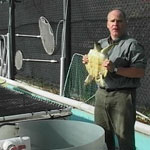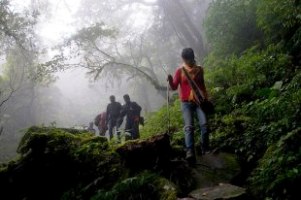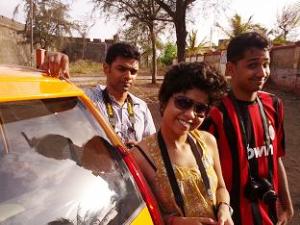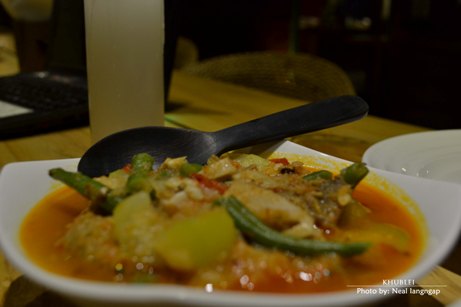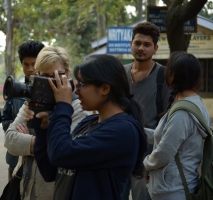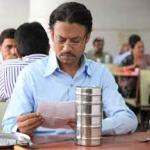1. Let's begin at the beginning. How was your childhood? Please tell us about your early innings in life, your family, friends. Was there anyone who inspired you to write or become a journalist?
I had a wonderful childhood and great parents. My mother who was just about 20 years older than me was my friend and companion. I had three brothers and two sisters and I being the tomboy of the family would fight with my siblings. My father being a government servant in a transferable job, I had my education in different cities-Mumbai, Delhi, Patna, Allahabad and Nagpur. I studied in convents and missionary colleges and stayed on in hostels to finish schooling, college etc. I loved my teachers-the nuns and fathers were a great inspiration. I was a University and state level badminton player. I would cycle to college in Nagpur, then cycle to play badminton in the evenings. When I was in college, the Railways wanted me to play for them and offered me a job but even at the age of 20, I knew I wanted to be a journalist.
My maternal grandfather in Nellore, A P, was bringing out the anti-British material during the Independence movement. He also brought a small but respectable literary publication. The hand operated printing press was in my grandfather's house and my mother, who was very young, would lay out the matter etc. When the police would come with search warrants, my grandmother would tell my mother lock the door and tell them I am in the bathroom, then quickly destroy the matter. I used to hear all these wonderful stories of my grandparents anti-British campaigns and wrote about it when my grandmother visited Delhi on Independence Day. The Indian tricolour flying on the Red Fort meant a lot to her.... She had actually fought for it.
But I really got into newspapers because I thought I could write well, loved meeting and interacting with people and used to bring out my college magazine. I don't think it was such a glamorous profession in the 60s when I got into it. I loved reporting and the longer I stayed in the newspaper, the more I got involved in social and human issues. For the first eight years that I was in the The Times of India, Delhi, there was no other woman in the editorial department and I had to share the toilet in the basement of the office building with the telephone operators. There was no toilet on the editorial floor.
2. How difficult or easy was it for a woman to be in this profession when you had first started? Did anybody ever try to stop or discourage you?
No one thought initially that I was serious about the profession. They thought I was passing time till I found myself an affluent, influential husband. In fact my editor Mr Girilal Jain at one stage even asked me what I was doing in a newspaper. This is not a profession for women, he said. But of course his views changed when one of his daughters got into the profession.
I was initially given only really goofy, soft stories-fashion shows, flower shows, Shankar's on the spot painting competition etc. I was pampered and not allowed to do the late night duty because I was the only woman in the editorial department. When I complained and said I should be allowed to do the more important stories, my news editor decided to fix by asking me to go to the bad lands of western UP to investigate rape and other crimes. I was terrified but had to accept the challenge. I asked for a photographer to accompany me. However, when the editor heard I was being sent to cover crime in UP, he pulled up the news editor and stopped my going out for the story. I had to constantly fight for good beats. All the important ones were taken by the men and they could not be budged from covering politics, the local administration, the municipal corporation etc. But Mr D R Mankekar, who was my editor for a very brief period liked my work and encouraged me a lot. I think I wrote better than many of the male journalists and that went in my favour. Even when I was not doing night duty, my colleagues would go the Press club and ask me to stay in touch with the police control room if there was a news break. When there was a strike by the nurses in AIIMS, the night duty reporter would pick me up from home and take me to the hospital for I, as a woman, would have greater access to the women's hostel at night. I was willy nilly pushed into doing soft stories and they became my forte. So that is how I became a development journalist and not a political or economic journalist. From my early writings on animals in Delhi zoo, I became an environment writer and a lover of wildlife and open spaces. I reported on the dangers of big dams and displacement of people, on the dangers of mono culture and eucalyptus plantations. Like the caterpillar turning into a butterfly, I went through a metamorphosis. I remember in the initial years I was even shy of riding pillion on two wheelers of my male colleagues. Should I hang on to their shoulder or would that be misunderstood? Because I wanted to be taken seriously, I wore saris to work and never wore salwar kameez, trousers etc. As more young people joined the newspaper, I was called Mom and even Behen Ram Pyaari by my senior colleagues.
My colleagues were very supporting but they smothered me with their affection and protectiveness. I remember in 1969 I had gone to cover a price rise demonstration outside the Super Bazaar in Connaught Place and there was tear gassing. I was then highly pregnant and my male colleagues came rushing down to rescue me. Even the magistrate on duty kept me behind her. I was embarrassed by all the protection and fuss.
3. You are said to be one of the pioneers of development journalism. Please tell us about how did you get into this genre of journalism. How do you see the evolution of development journalism in India?
I think I have partly answered this question with the earlier answer. I was propelled into it because I was not allowed to do other beats and began loving writing on nature, people's grassroots movements, education, health and social issues. There were not too many takers for those beats so they fell into my lap. Because the stories were so different, they started getting front page. Women's issues were being taken seriously for the first time and people would call me up and give me information. The TOI was the leading paper in those days and environment stories too would drop into my lap. Though there were neither mobiles nor emails in my early years in the profession, I would get phone calls and tips on how national parks and sanctuaries were being violated by contractors and insurgent groups hiding in the thick jungles. I was with Dr Veena Mazumdar when the first report on the status of Indian women was released, when Margaret Alva announced her National Perspective Plan and Ela Bhatt's Shram Shakti report on women in the unorganised sector was released. I campaigned and saw the setting up of the National Commission for Women and worked closely with the chairpersons and members to high light the condition of women across the country. I watched the drowning of Harshud town in MP as the dam on the Narmada was being constructed and shared the agony of people of the people when Tehri Dam was constructed. I was among the first to report on infanticide in Salem district and in Rajasthan. When the Beatles and one or two of Hollywood's actresses came to Delhi on their way to Rishikesh for a course in transcendental meditation by Maharishi Mahesh Yogi, I followed them to the Ashram and did one or two stories. In 1968, I sneaked into Indira Gandhi's house to be able to cover Rajiv Gandhi and Sonia's wedding.
I was an unabashed activist on social issues and people knew I would listen to them if they came to me with stories. I was elated when my stories had an impact and was spurred to writing more. I never took leave-expect for maternity leave when my children were born. I was healthy as a horse (mare) and stories and bylines pumped adrenal into my system. After 27 years in The Times of India when, despite carrying my stories on the front page of the newspaper, I was given no incentive or the next grade, I left the paper and joined as development editor in the Indian Express on a contract. I fought and ensured I got the designation of 'development editor' and a whole page for development news. I ensured that it was opposite the edit page and visible. It was a page common to all the 16 editions of the Indian Express. But after a few years my page was shrunk to a column to accommodate stories on World Cup football and I knew it was time for me to move on. But my years in the Express and the Times were the best. I enjoyed every day of reporting-despite some frustrations. Even a broken marriage and the responsibility of bring up two children on my own, did not take away my passion for journalism. In fact, it helped me to get over the trauma. I had to make professional sacrifices in terms of career mobility because of the responsibility of my children. They were then 4 and 7 years and I would sleep one on either side of me. My son was shattered and in my desperation to continue working for now I was their sole bread winner, I sent my son to a boarding school. It was a great mistake. He was traumatized, forgot to read and write and kept trying to run away. But living with me, made my children independent. They learnt early in life to keep the house tidy because their mother was at work. I had a sarkari house but not much of a salary and grew very close to my children. I had great colleagues and friends and they kept my morale high. Then there were the bylines to spur me on!
One of my closest friends was Prabha Dutt, who joined around the same time that I did in Hindustan Times. Both of us were passionate about our work and a great support for each other. Her death at an early age shattered me as much as the breakdown of my own marriage. I raised funds and established the Prabha Dutt Foundation. I would visit her home often and stay in touch with her family and saw how well their father, Speedy, brought them up. The PD Foundation gives a fellowship every year for a woman journalist with investigative skills.
Because of my coverage of development issues, I got the opportunity to travel abroad and report on the large number of the international conferences on education, health and development, environment etc. I even worked on secondment with the Times Education Supplement of the London Times on Fleet Street and came back with new confidence and vigour.
The evolution of development journalism has been slow. With the arrival of television, glamour, food, fashion and Bollywood took away whatever little space there was for development. Despite P Sainath, Darryl D'Monte, Kalpana Sharma and several other journalists, social issues were increasingly get marginalised. Catering to commercialism, Health Pages became Wellness pages. There were colour supplements filled with trivia and salacious gossip. My old newspaper was the trend setter for paid news, gossip, glossy colour supplements. Trade unions were dying and everyone was forced into contracts so that their survival depended on the whims and fancies of the top bosses. Editors themselves were sidelined and replaced in some newspapers by managers who were more concerned about getting ads etc. I remember the anger and outrage of journalists when the TOI played around with its masthead and the ears of the newspaper were sold for ads. A young and brash owner of newspaper said of P Sainath's wonderful stories from the poorest districts of the country "what are these downmarket stories doing in an upmarket paper like mine." He even said about one of the greatest editors, Girilal Jain - what is Girilal but a shooting star. We have put him there and we can shoot him down." (I will send you some articles that I have written on how the rise of Naxalism can be connected to the fourth estate's failure to document and take up cudgels on the unequal development taking place in India. We have not reported on the underdevelopment of our villages, the marginalisation of tribals and others.) Rural development per se is not high on the list of ministries covered by the media. You need good journalists to travel and put out good stories on rural development.
4. Do you think media today is obsessed with trivia? How can we bring back serious issues concerning our lives back into the menu of the so-called 'mainstream' media?
I think this hype and hoopla on trivia will settle down and there will be a focus again on development news. I think pressure should be put on newspapers to cover rural India, the poor and the marginalised. Did you see Aamir Khan's Satyamev Jayate on Star Plus on Sunday. It was a fabulous programme on sex selection and he is planning to follow up etc. It is programmes like that that would shame civil society and push the media to get the focus on inequitable development. The journalists rightly don't want controls but the Press Council needs to get more teeth. Chairperson Katju seems a doer. We need many more Sainaths, Kalpana Sharmas and others like them to show other journalists that development is good news, great for the country's economy and image. The journalist who writes on development should be feted and honoured so that he/she becomes a role model.
5. You have seen journalism develop in its different phases. How do you see this evolution?
Unfortunately it is TV journalism that is dictating media trends. But the best think about this phase of media is the growth of women journalists and the positions they now hold. Unfortunately, the status of women journalists in the regional papers is not that good. Because of the contract system, a lot of them are losing jobs. We need in particular to influence the regional media, which has the greater readership, to take up development issues. The government should have good political leaders, articulate and concerned, heading the Ministries of Rural Development, Health, Education and Environment. Sonia Gandhi's National Advisory Council is focussing on social issues. We need to strengthen it.
6. Will it be appropriate to state that you are the one who had mainstreamed women issues in the media?
To some extent in daily news. But before me there were people like Promila Kalan in HT, Shanta Rangachary in the Statesman, Kamla Mankekar in TOI and IE and Rami Chabbra in the Statesman who promoted women's issues. Even Femina promoted serious women's issues at different times as did Gulshan Ewing in the women's magazine brought out from Mumbai (I have forgotten the name of the mag).
7. As a pioneering environment journalist as well, you are also remembered by your colleagues as someone who had planted trees which exist even today on Delhi's Fleet Street ie Bahadur Shah Zafar Marg. Please tell us more about it.
A. Initially, there was a great deal of resistance because the newspaper offices said they needed the space for cars and not trees. Several trees that I planted died. But a few years later when the trees grow providing shade and shelter, the owner of TOI would not allow any other car to grab what he claimed was his space. The paan, cigarette and tea shop owners on the opposite side of the road approached me to plant trees and provide them shelter. I was able to do that approaching concerned authorities for tree planting. But the earlier plantation, I did it on my own with some friends and colleagues. We brain stormed with experts on the best trees for the area and dug up and planted them. Then followed up for several months watering the trees. But some of the saplings were crushed by cars and died.
8. Which has been your best story till date and why are you proud of it?
I think it was the series of articles that I wrote on harvesting machines causing several farmers (men, women and children) in the states neighbouring Delhi to lose their hands in the threshing machines. I got the story accidentally, when an anaesthesist at Safdarjang Hospital told me how she had been awake the whole night because of the many hand operation cases that came to the hospital. This was at the peak of the harvesting season. I met the patients, doctors and agriculture ministry officials and ran a story which the TOI carried as second lead. I ran a series of articles on lack of electricity in UP, Rajasthan etc forcing people to do the threshing work even if it was in the middle of the night whenever power was available. Many of the threshers produced locally had no safety device so the hand could go right in. Others remove the safety device so that they could operate with greater speed when power was available. Many of them were on drugs to stay awake and maximise threshing. The stories had a phenomenal impact. There was a clamour to standardise the machines. The National Institute of Design in Ahmedabad and several other agricultural university began working on new, improved designs. The Indian Council of Agricultural Research produced poster on the dangers of removing the safety catch, not taking drugs while at work etc. They were flashed on Krishi Darshan, a popular programme for farmers on Doordarshan. A public interest litigation was filed in the Supreme Court and for the first time a decision was taken to extend the compensation for industrial accidents to agricultural accidents.
I went back to the hospitals for several years reporting on thresher accidents that were still happening but maybe in lesser numbers. I also did a story on the specialization in reconstructive hand surgery in Safdarjang.
9. How do you think can be done to bring back under-reported regions like the Northeast of India to the agenda of the so-called 'national' media? Please tell us about your association with this region?
The National Foundation of India has done a lot to encourage reporting of the Northeast. They gave senior journalists like Darryl an opportunity to travel and write about the region. I think reporting of the Northeast is already better. People like Shekhar Gupta, who was a correspondent based in the North East, have done a lot to promote the areas.
I think people like you could share story ideas with freelance as well as regular correspondents. Most journalists are lazy, arrogant and laid back but you will find the good, committed journalist who will write on the Northeast. You need to lobby with editors to back a good story from the northeast with a good edit.
I think when a lot is appearing on the alienation/ suicides of North Eastern students in Delhi, Bangalore and other places-it is a good time now to do these stories.
Also there should be positive stories from the Northeast-innovations by the IITs in the North East, the fabulous Mary Kom and boxers, footballers of the North East. Look at the number of young people from the North East winning music and dance competitions.
I have come to the Northeast several times both for environment stories as insurgency stories. When my nephew, Sanjoy Ghose, was in Majuli and was threatened/ asked to move out by underlings of ULFA, I came to the North East and wrote about the threats to his life and several other stories that he gave me ideas for. I was in HT then and the story on 'threats to NGOs' came out on the front page.
I came back again on July 6, 1997, two days after he was abducted, with my brother-in-law Shankar Ghose and stayed there for about 12 days till the police told us he was drowned in the Brahmaputra. Those again were traumatic days for the whole family because Sanjoy was such a committed and bold worker. The children were in Delhi and I stayed with Sanjoy's wife, Sumita, till I could bring her home. He had obviously misread the anger against him for exposing all those contractors and ULFA agents who were cheating the people.
10. Do you think women make better journalists? Does a journalist's gender matter at all?
I think the women are good writers. They probably got into the profession because of writing skills. As a journalist you need to be confident (not arrogant), outgoing, enjoying meeting and interviewing people and have the staying power to keep at a story till you get results. I think men may be better at information gathering-winning and dinning with sources at the Press Club and other places, meeting contacts at any time of the day or night. Men are able to better lobby with newspaper barons and top politicians for top jobs, secret information, leaks etc. These are some gender advantages. Single woman or married woman with no kids have better chances of succeeding as journalists than women who have to balance child rearing and a career. I remember my friend Venkatesh of the Statesman telling me how difficult it was to look after his children and work when his wife died leaving him to care for two young children. His biggest problem was plaiting his daughter's long hair for school every morning. He did not want to cut it because his wife had spent so much time and care growing it. The long hours of work that journalists put in and the fair amount of travel makes it more difficult for women in a competitive profession like journalism. I find a lot of the female members of my fraternity are single.
11. How can we improve the difficult working conditions for women journalists like lack of separate toilets, maternity leave etc. You had fought for maternity leave for yourself. Please tell us more about it and if the situation has changed over the years.
Yes things have changed in terms of toilets, maternity leave and equal wages in the English media. However, the contract system has made it difficult for young women to get jobs.
12. There has also been a mushroom growth of journalism schools in India. Do you sense a change in the way journalism is practised and taught in India? Are you a trained journalist yourself?
Yes there is-- because opening journalism schools is a business for newspapers and TV channels. I think the Times of India in the late fifties and early sixties had a got training school. It was the equivalent of training given by the Lal Bahadur Shastri Academy for civil servants. They travelled across the country and were mentored by professional leaders and then found placements within the newspaper. Of course, journalists who came from Oxford or Cambridge were taken in straight as assistant editors. What I am worried is about the ethics being imparted by these mushrooming schools. I joined as a trainee in the Indian Express,Mumbai, soon after leaving college and worked with various departments - desk, reporters, Sunday section. I was under the care and guidance of seniors right through my one year of training.
13. Please tell us about your present everyday life, your grandchildren, family etc?
I still work very hard. I work with two of my colleagues bringing out newsletters, documenting programmes like the Bal Bandhu Scheme of the NCPCR, conferences and doing media advocacy work for NGOs and the UN. I have researched and written about the status of the Vrindavan widows for UNIFEM and UN Women (two studies of 1997 and 2010-2011. With my colleagues I have prepared communication strategies and the World Bank on integrated coastal zone management. Have researched and documented in book form for the UNDP and Population Foundation of India how reporting by journalists adds to stigma and discrimination of the HIV and AIDS infected in 2005. I have subsequently helped the Press Council to change its guideline on HIV & AIDS reporting. In 2008 we invited journalists from India and South Asia for the Asia Pacific conference on sexual and reproductive health of adolescents and others. The entire media facilitation was done by my team .
14. Can a journalist ever retire?
No, a journalist can never retire, nor should be retire! As long as you work and stay mentally and physically active you will keep off old age and dementia. Currently I am working on a project for HelpAge on Ageing and Health.
Find us on facebook: facebook.com/TheThumbPrintMag









